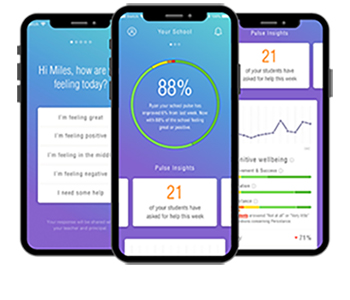Early adopters commit to Student Pulse for 2021

In May, when teachers, students and parents were coping with the complexities of remote learning, Educator Impact made its new student wellbeing tool Pulse available to schools on a ‘Pay what you can’ basis for the rest of the 2020 school year. And, welcoming the opportunity of a weekly ‘check-in’ with their students, schools across the country signed up.
Participating schools have since been able to monitor each student's wellbeing on a weekly basis, following their ups and downs over six months.
Educator Impact CEO Nabil Shaheen says that he’s anticipating that all but a few of the early adopters will renew for 2021, confirming their positive experience during the months of COVID-19 disruption.
 “Pulse is anonymous and it only takes 60 seconds,” Shaheen says. “With a weekly check-in, students reflect on their mental health and answer science-backed engagement and wellbeing questions that can provide statistically significant school-wide wellbeing data every week. Schools were asking for a better way to capture ongoing student wellbeing and engagement data… a twice-yearly or annual survey can’t do that.
“Pulse is anonymous and it only takes 60 seconds,” Shaheen says. “With a weekly check-in, students reflect on their mental health and answer science-backed engagement and wellbeing questions that can provide statistically significant school-wide wellbeing data every week. Schools were asking for a better way to capture ongoing student wellbeing and engagement data… a twice-yearly or annual survey can’t do that.
“Students live in a social media world … they feel at home and willing to answer the Pulse questions on the app when they might be reluctant to approach a teacher face-to-face.
“The feedback has been overwhelmingly positive; if Pulse identifies just one student that needs help in a school, it’s been worthwhile.”
Jesse Manners, Leader of Wellbeing at St Philip’s Christian College – Gosford Campus is a convinced Pulse user. The 600-students school is one of four K-12 schools in the St Philip’s Group and the second after the Cessnock Campus, which was part of the pre-launch trial, to implement the tool. The Group also has multiple Dynamic Alternative Learning Environment (DALE) sites, young parent schools and early learning centres.
An inclusive education teacher originally, Manners says: “Student wellbeing is central to everything St Philip’s schools stand for. I’m passionate about how evidence-based data can be used to drive student intervention.
“We had dabbled with several approaches here and there but until Pulse came along, there was no solid data gathering tool that could identify the effect of bullying in Year 6, for example.
“Because [wellbeing] evidence is gathered week by week, we know from the trends we see in the data what’s happening in Year 9 and we meet and discuss with year advisors with real time information to work with. We know our students well, so when the data shows that a student who has been all Green going to Yellow or consistently on Orange, or Red we can reach out to help.
“We usually get two or three students a week – and they are not always the students that we would be aware of – we might have a student that had not been on our radar, or was too nervous to come up and talk to their pastoral care teacher in front of a room full of students use Pulse to do it discreetly and know that someone will connect with them that day.”
Of students asking for help, at least 50% would not have asked help from the school before, with suicidal thoughts, trouble at home and struggling with social issues commonly raised. The first contact is usually with pastoral care, though a student may bypass the names listed in Pulse and nominate Manners or even the Principal.
“When a cry for help comes in, Pulse sends an email alert to the person nominated and to me … an immediate response is crucial when an ‘I need help comes in,” Manners says.